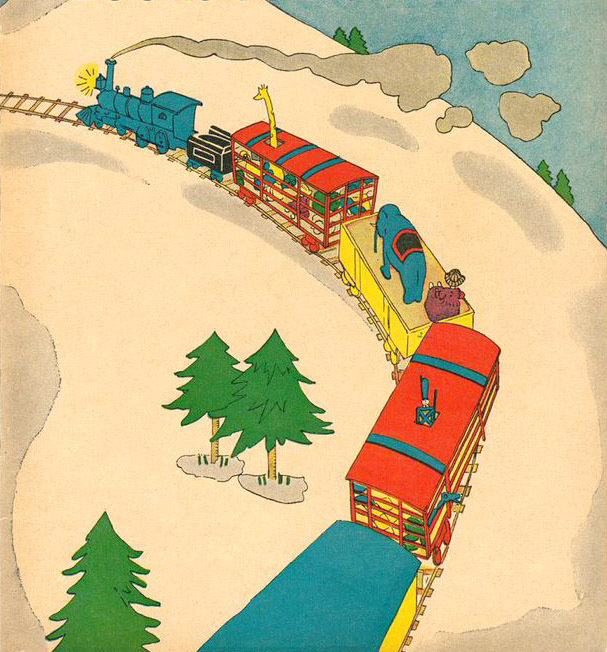Author Archives: Irmgarde Brown
The Desert Touches My Heart
Nature slams up against my mind and says, “see me!” Everywhere we stop and look, the wonder is palpable and often I want to say, “stop, no more.” But it doesn’t abate. God speaks through the wind and the distance mountains, the miniature flowers in the dry and unforgiving land.
On Wednesday, we went to the Petrified Forest. I hadn’t known what to expect; I didn’t preview that world; I just showed up. I learned that there had been a true forest there, millions of years ago, before T-Rex. What? How could that be? And those trees that collapsed for whatever reason, landed in waters filled with silica that eventually replaced the organic matter. As the landscape changed again, those stony trees began to come to the surface, but brittle, and many broke into chunks like sliced carrots or chalk. We only see the remains today. Mysterious and beautiful, the petrified tree pieces lie about. And all I could wonder: did those trees, that once breathed and spoke to one another through their underground network of roots, are they silent now? Is it just a graveyard? I really don’t know. Oh, trees of the world, tell me.
In the distance, the painted desert showed its colors, muted yet wondrous all the same. I didn’t know… again, that the painted desert was great hillocks of pointed rock showing layers of life.
There were human touches along the way, like the Painted Desert Inn, long ago built for the pleasure of tourists, bedraggled and then renovated again. A throwback. Inside was a jukebox and the original soda counter with a menu touting ice cream for ten cents. The wood furniture was made by the young men of the Civil Conservation Corps. The views from every window of the desert colors.
From there, we drove to Gallup, New Mexico for an authentic Mediterranean meal (go figure) and then a quick trip to the historic El Rancho Hotel for a cocktail. Lights out early in preparation for our drive to Santa Fe.
Every one of our drives has been about three to four hours and filled with the changing vistas of the desert. I thought I would be ready for a day in the city, but in the end, my heart was being called back to nature. We did manage a quick visit to the Basilica of St. Francis and the Loretto Chapel, with its mysterious spiral staircase. For many, this staircase is such a wonder, that it has been deemed a miracle, and several tourists prostrated before it, rosaries in hand. Our last stop was the Governor’s Palace and then off to La Choza restaurant (recommended by locals).
Here’s the thing about this place – the wait was over an hour, but the drinks were quite good and the food even better. If only we hadn’t had the nippy weather. Why did I bring so many summer clothes?
What will Friday bring?
Grand, Grander, Grandest
When Kathy said she had never seen the Grand Canyon, we three college friends knew we had to include this extraordinary place in our whirlwind road trip. I know, I know. In many ways, the “in-person” Grand Canyon doesn’t quite compare to the many postcards available at the gift shop or the coffee table books full of first class photography gathering dust. I agree, those professional photos are far better than what we could actually see on a blustery, hazy day.
And yet, there is something that happened in my heart as I stood on the south rim. Framed by bare limbs and pine trees, the ribbons of rock spoke—history, geology, eternity. A part of me wished I could simply sit down and contemplate the view, but we kept moving and walking and snapping quick pix. They would never tell the true story.
Later, after dinner, we squeezed in a 45 minute IMAX movie called Grand Canyon: Rivers of Time, just newly out in 2022. Fabulous. My heart soared as I watched the movie and realized it was a little like the feeling I had, standing alone at Lookout Studio. God is in this place.
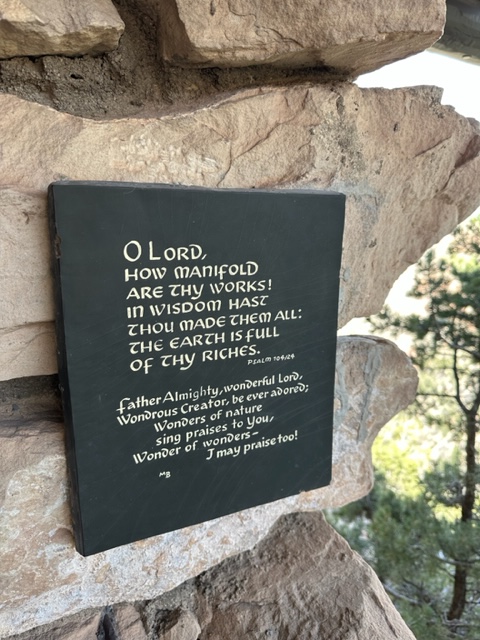




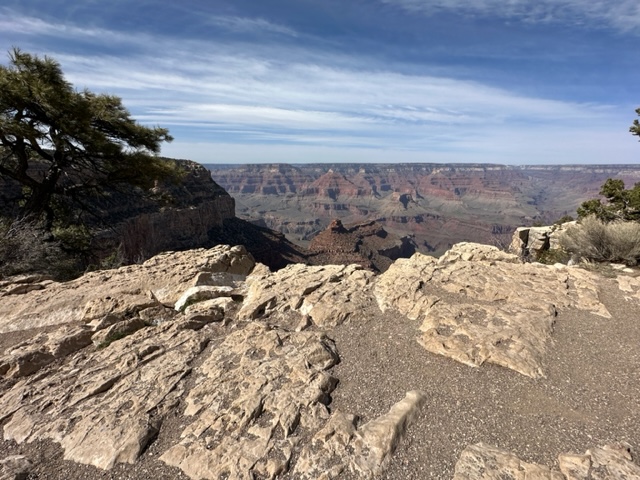
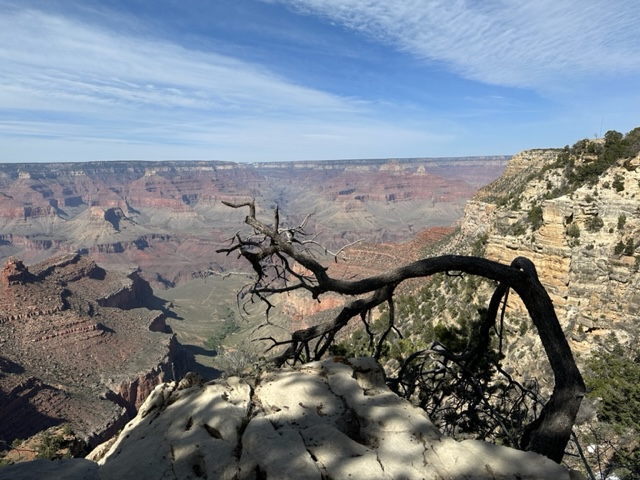
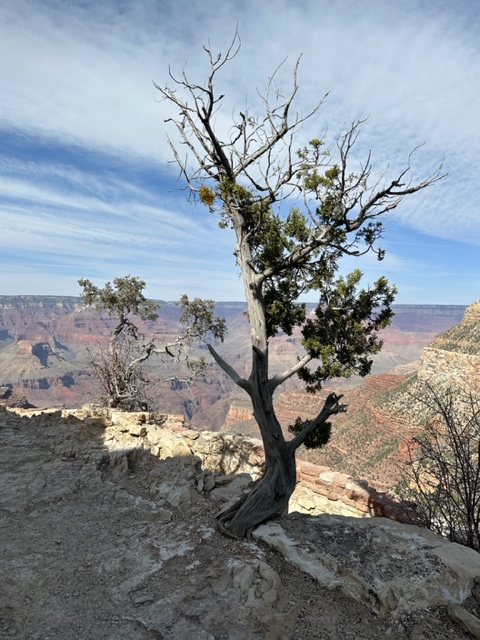

Embarrassed By My Unknowing
This morning I woke early, what with the time change from Eastern Standard Time to Mountain Time. I thought it would be a good time to review our day yesterday and look forward to the adventures of today. Our next door motel guests must also be from out east as they have been up long before me, the one whistling while taking a shower.
The motel is hysterical, the Canyon 66 “Ramada Wyndham” with its array of movie star murals and “Get Your Kicks from Route 66”. That’s right, we’ve landed for the night in Kingman, Arizona after a quick visit to the Hoover Dam. I’m guessing this is an old motel that was bought out by the Ramada people, but the only things that speak Ramada are the paper coffee cups and packets of whitener in the bathroom.

This is my second visit to Hoover Dam, the first being over 40 years ago. Since then, the Bureau of Reclamation has done a pretty nice job in the Visitors’ Center with historic displays and a 10-minute movie that highlights the accomplishments but skirts the water issues of the day. Along the rock walls of the Lake Mead side, we can see the once highwater mark from 1983, but today, the guide confessed, the lake is at its lowest point since the building of the dam in 1936. That’s sobering. But the tour through the turbines and the tunnels was fascinating and awe-inspiring. I recommend everyone take the time to visit.
But my lack of knowledge abounds as I look at the desert landscape. I ask my Southwest friends to forgive me for dullness of mind that became apparent when I tried to google the name of the lovely little purple and yellow flowers blooming along the side of the road (Highway 93). I thought it was an easy search only to discover that a myriad of yellow and purple flowers bloom in the desert. Duh! More than likely, the purple ones are Sand Verbena, but the yellow could be Desert Dandelions or Desert Marigold or Brittlebush.
I have no understanding or appreciation of the desert and really, I need to change that. I doubt this trip will do much more than make a dent into my blank slate. Naturally, I’ll take some pictures and do more investigating when I get home, but one thing I can do is really look. It’s hard on a road trip to make a lot of stops, otherwise, we won’t make the next point on the map. I make this small promise to myself, when we do stop, I’ll look in the distance, of course, but I’ll also look down, near my feet and perhaps a few wonders will be revealed.
Driving a Car
In today’s western culture, most people can’t even imagine not having a car, or at the least, most had a driver’s license, just in case. But for my family, in the fifties, such a luxury was unthinkable. We took the public bus everywhere we could, including school, since my brother and I both attended special programs outside our “districts.” School busses were unknown to our community at the time.
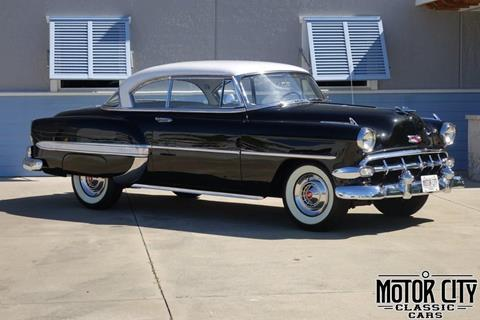
When my brother went to high school, he was offered the opportunity to take “driver’s education” as one of his regular classes. This paved the way for our family to have a driver at last (around 1962), for good or for ill. Somehow, my mother, not long widowed, bought a a 1951 Chevy for $50.00. It threw a rod within a year and then we got a 1954 Chevy which my mother decided she would learn to drive. Considering her size, about 4’11,’ she basically looked through the steering wheel.
It took about three years for my mother to successfully pass her driving tests. In the Latvian community, she became the driver for many of the older ladies. My brother and I felt anyone who was in the car with her was basically putting their lives at risk. Amazingly enough, she had few accidents. The one time she ran over a median, she wrote a letter to the editor about the poor placement of the median and cc’d the Mayor. The city paid for her damages.
My brother managed to have enough car accidents for all of us. I wouldn’t say he was reckless, but he was impetuous. His worst accident caused several broken bones including his jaw. He lost a lot of weight that year since they set it incorrectly and he had to have it re-broken and wired shut a second time. To this day, he drinks very few shakes or smoothies.
I was younger than most of my classmates and thereby, did not take driver’s ed. until my senior year in high school. This was the give-away to my age and many taunted me for only being sixteen. Nonetheless, I was anxious to get out from the passenger side of my mother’s car.
Mr. Dill was my driver’s instructor and he found my name completely unprounounceable. Generally, he avoided saying my name altogether, but one time, while I was driving and two sophomores were in the back seat waiting for their turns at the wheel, a squirrel ran across the road in front of me. Naturally, I braked. Mr. Dill went apoplectic, stretched his foot over to my side to gun the car and said, “Step on the gas, Imengurdie, step on the gas.” The next week was unbearable with a new nickname to mock me and a close call with squirrel murder.
The Last Shall Be First
I’ve had quite a pattern of “lasts” that have informed far too many of my bad choices along the way. As a young person, the idea of being last felt like major failure. In my family, “failure was not an option.” The joke? Most of my last places were in the top tiers. That’s right. I was the last of the best as opposed to dead last. And yet, it felt the same to me. Last was last and first was good, better, best.
My first example of this phenomenon is in third grade. Back in the late fifties, “exceptional” children did not attend classes in the same school as the regular kids. Instead, like today’s magnet programs, there were designated schools for a wide variety of special classes.
My brother was the first in our little inner city school to be offered an opportunity to attend one of these schools for high performing, high IQ students. He tested very well and upon entering the 4th grade, he rode public transportation to a school that offered gifted and talented classes through 8th grade. When I came up to grade, my mother wanted the same program for me. But unlike my brother, I struggled with the testing and I remember how the proctor told my mother, in my presence, “she’s borderline and if you send her to this program, she will be at the bottom of the barrel.” Lovely.
From that point on, I was on the lookout for more rock bottom experiences.
No surprise, then, when I would be the last one picked for kick ball or the last one in line for lunch. I was the last to understand the math and the last to get the joke.
I played a clarinet in that special school. Last chair. Later, I was accepted into all-city band. Of course, last chair again.
In high school, my mother insisted I take German instead of French or Spanish. And, as a result, I had the opportunity to compete for a statewide AFS summer experience in Germany between by Junior and Senior years. Only thirty students from the state were invited. What an honor. Of course, upon being accepted into the program, I was told I was at the bottom of the class and would have the farthest to go language-wise.
When graduation time came in high school, the top seniors of the class sat on stage for an in-school program where scholarships and the like were announced. We sat in order by our grade point average. I’m sure it’s no shock which seat was mine. Last of the best. I was drowning.
There were other lasts, but these are the ones that replayed regularly through my head as I weathered college and my early adult years. Never good enough: I was the little engine that hoped she could, one day, be at the top of her game, the top of the hill. But even when things appeared to go my way, I got really good at finding the dark cloud.
When I was accepted into a Master’s Degree acting program in New York, that felt good until I realized the school was on its last legs. They must have accepted everyone who applied. This was my self-damaging talk at its best.
What is the upshot of this negativity and self-deprecation? I’m sure there is no standard life response. For me, I translated it all into a drive for fame, not particularly fortune, but fame alone would fit the bill. Unfortunately, the drive was often broken by the old voices and the old scripts. Once a project that was aimed for fame went awry, I walked away before the last seat opened up. Better to have no seat than that one.
Ironically, when I encountered Christ and became a woman of faith in 1979, a common reaction by my peers of the time was something like, “You? You became a Christian? You are the last person I’d ever think would do that!” This particular comment became a signature line for my testimony, as it spoke volumes. The last person indeed.
But all of these examples are about my “first half of life,” a phrase used by such writers as Fr. Richard Rohr (“Falling Upward”), James Hollis (“Finding Meaning in the Second Half of Life”), and columnist David Brooks (“Second Mountain”). Clearly, the more relevant half now is the second half which I am grateful to finally enter, or should I say, fall into. In this half, there is no last or first. The ego can rest and be released while the soul flourishes.
Rohr writes that the transition between these times of our life is like moving from a “survival dance” to a “sacred dance.” My dance card is full, but not with people, tasks, and shoulds, but with simplicity, discovery, and hopefully, a growing awareness of now. I still have a lot to learn and experience in this new chair.
That is, assuming I get through this dreadful year of political hijinks, climate catastrophes, and Covid 19. Will this be the last? Or the first?
The Black Cat
My mother loved animals. All animals. Both her back and front yards had become overgrown over the years as she was unable to maintain them. She was unconcerned and considered her yard her private “woods.” Wildflowers abounded along with perennials, bushes, trees and tree seedlings, and all manner of growing surprises. And critters.
She had chipmunks and squirrels and snakes and mice. And of course, one of her besties, the opossum who lived in the falling down shed. A great variety of birds frequented her special feeding station every day, many of them so familiar that they sat waiting for her every morning and evening.
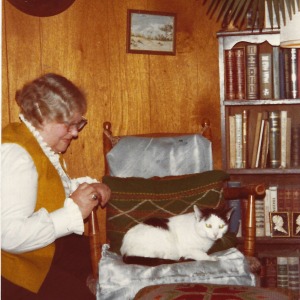
For a season, she had a cat (trained to never chase the other critters) and even a dog. The cat, Adatinya, died at a ripe old age, literally collapsing at my mother’s feet. Mom considered it an honor. The dog became problematic early on; a stray who had adopted my mom, he wouldn’t stay in the yard. The neighbors complained and in the end, the dog catcher got him. Mom cried.
This is just backstory for the tale to come, to demonstrate her love for living things. That is, until the black cat took her over the edge.
It was a beautiful day, so Mom decided to sit out front, crack the storm door so Adatinya could come out and sit with her while Mom did her word search puzzles. Sure enough, Adatinya slipped out and lay at my mother’s feet until, out of nowhere, a black cat jumped out of the bushes and attacked Adatinya. Mom managed to block the cat from giving chase into the house. Her blood pressure skyrocketed, the black cat fled.
About 45 minutes later, Mom decided to try again. She cracked the storm door and Adatinya came out after a time. Mom immersed herself in the puzzles. But of course, the black cat attacked again. This time, the cat managed to follow Adatinya into the house, around and around they went. Mom used a broom to cast the demon out of her house. Her midday peace was ruined.
A few hours later, she tried again, cracked the storm door and all. The sun was close to setting, the birds were chirping. It was the golden hour.
How was it possible that the black cat would return? But it did and with a vengeance, once again slipping through my mother’s hands and giving hostile chase. My mother was apoplectic and determined to catch the devil.
After several trips around the house, Mom caught the cat. She held him (her?) down on the floor and began to strangle the life out of him. The cat’s bowels gave way. With only seconds to go, Mom cried out, dismayed.
Never had she hurt another creature. She let go. The cat was very still for several moments and then slowly stood and left her home on his own.
Mom wept. She called me to tell me all about it, in tears. The cat never came back again.
Spilled Milk
“No use crying over spilled milk!” is a well worn proverb and most likely, evolved from Europe where fairy lore was much beloved (fairies love milk). But, apparently, my Latvian mother was not a strong adherent.
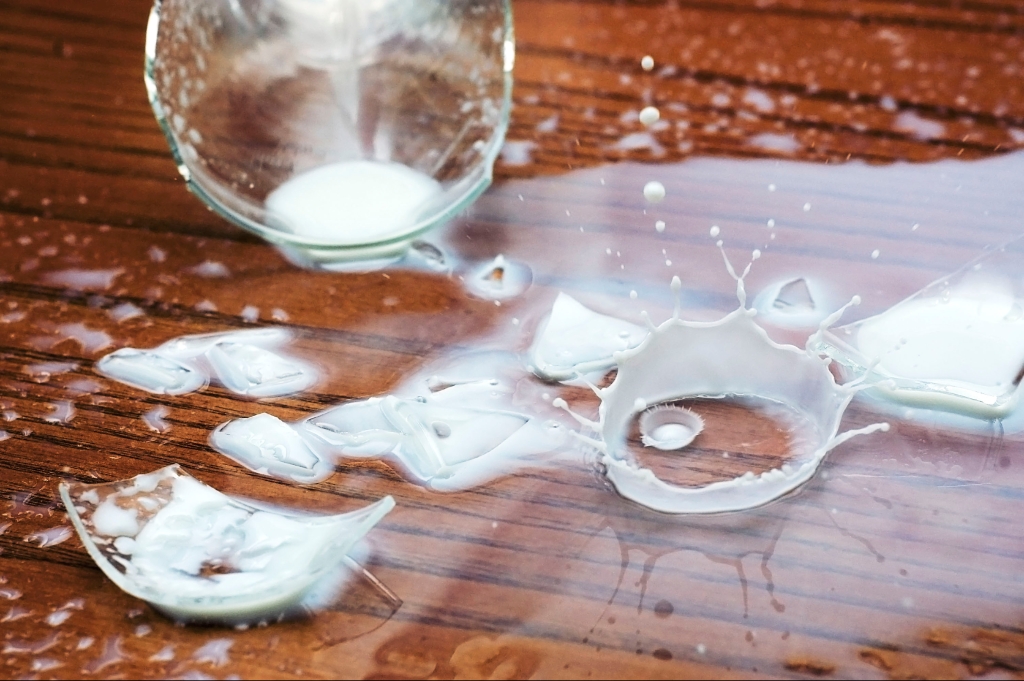
To be fair, she is a product of the great depression that affected Europe nearly as much as the U.S. She knew what it meant to be poor and hungry. And then there was the Second World War when food was rationed and, unless a generous farmer lived nearby, milk and butter were rare.
That’s the back story to the physical realities that caused a brutal slapping across my head and face for trying to carry too many glass quarts of milk from the milk box into the house and to the kitchen (Note: Our portion of the house was like an odd railroad apartment: big room was family room, medium sized room was master bedroom, and kitchen. My brother and I shared an small room off the big room. We shared the bathroom with three upstairs “tenants.”) Anyway . . . to avoid dropping the quarts on the floor, I dropped them instead on my mother’s bed, thinking it was soft and would absorb the jolt. I didn’t consider the bottled striking one another. What a mess.
I was ten.
There is a deeper message here. The yelling and hitting obviously made a deep impression since that incident was over fifty years ago and I remember it vividly. But I also learned that my mother was deeply triggered by loss and waste.
As an immigrant after WW2, in 1951, she and my elderly father (25 years her senior), and my 5-year old brother [I was still in the womb], suffered many losses to come to this country. Identifying as Latvians after the war, they were shuttled from one displaced persons’ camp to another. With each truck ride, something more was left behind. No room, no room.
Before the war, in the late 30’s, my mother worked as a nanny for a wealthy German ship baron with a great fleet of merchant ships. As repatriation began in the 30’s to return to “Mother Germany,” this shipmaster decided to move his entire operation to Germany. Did Herta want to go with the family? They promised to take care of her. Besides, she spoke both fluent German and Latvian and some decent English to boot. She was a vibrant 20-something and it sounded like the opportunity of a lifetime. Or, so it seemed.
How could she have known what the war and the Third Reich would bring to her small bubble of a life? How could she have known that she would lose her only brother to the war, never see her father again or her stepmother, and within ten years, have nothing but a single trunk of clothes, pictures, books and memorabilia. And a guitar that was left at Grand Central Station: no room, no room.
In this country, during the 50’s, she and my father did the best they could. He spoke no English. They were janitors mostly and lived off the generosity of others. Eventually, my mother got a full-time office job as a clerk (a job she held for 30 years). They bought an old house near downtown Indianapolis and rented three rooms upstairs to make ends meet.
Then my father died at age 72. Once again, the loss overwhelmed her.
I believe, now, the anxiety and fear of raising two children alone in this strange new land, with very little income, no car (or driver’s license), and no ready understanding of how this country worked, took a great toll on her psyche.
Yes. On the day I broke those bottles of milk, they also broke my mother.
